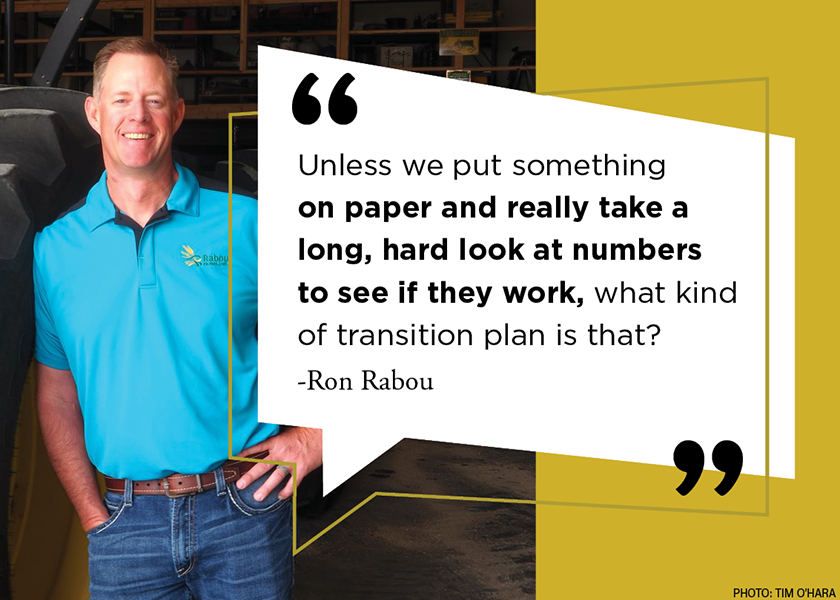Just How Bad Can a Farm Transition Go? 4 Lessons Learned

Ron Rabou spent the first 26 years of his life expecting to return to his 5th generation family ranch in Wyoming. When his father passed and it came time to put pen to paper in the farm transition, negotiations weren’t as easy as Rabou, nor his family, imagined.
Now a successful crop farmer and author, Rabou shares transition planning lessons-learned through writing, public speaking and podcasts.
Here’s the latest advice he shared with Andrew McCrea in an episode of Farming the Countryside podcast.
1. Have the Hard Conversations Now
Rabou’s operation goes back five generations. With that, the farm’s buy-sell agreement included a clause that stated only men can inherit shares of the farm. As you might imagine, this led to fractured ties when one of the farm’s partners had only a daughter.
While the operators would share discussions about buy-sell agreements, estate plans and trust in business meeting, Rabou said the conversations never included talk about the partner not having a son—despite their knowing about the clause.
“A lot of times we’re fooling ourselves in thinking we have a plan in place without thoroughly thinking through what that plan might actually mean for the next generation,” Rabou says.
The issue only became worse when Rabou’s father suddenly passed from a heart attack, and he found himself lodged between more buy-sell clauses.
“I was in line to inherit my grandfather’s share before my dad died. Because my dad passed away before my grandfather, and I’m not my grandfather’s son, I couldn’t inherit his share. Two clause words completely changed the course of our family business forever,” Rabou says.
While Rabou’s situation might be unique, he says there’s a greater lesson for farm families.
“If we don’t have hard conversations when we’re alive, those harder conversations will be transferred to the next generation and become even harder,” Rabou says. “Have the right conversations now; Not just any conversation—the right ones.”
2. It Takes a Village
The traditional approach to a transition plan often looks like getting in contact with an attorney. Rabou says this is a good first step, but there should be plenty of other irons in the fire.
“Transition planning is bigger than what an attorney or accountant can figure out. Because the dynamics of the production world, ag and families are constantly changing, we need to focus on bringing a team of people together instead of just one person,” Rabou says.
An attorney and an accountant should be part of that team, according to Rabou, but he also suggests a life coach, ag consultant and a mediator.
“If we bring in a non-threatening third-party to helps ask questions and disseminate information back to the family, then we’ll have teamwork that ensures the best fit possible for everyone’s circumstances,” Rabou says.
3. Lay Out the Information
No matter someone’s occupation, retirement is generally a goal that comes up in conversation more often as the finish line approaches. But how often is it spelled out in ag? Not very often, according to Rabou.
“Unless we put something on paper and really take a long, hard look at numbers to see if they actually work or not, what kind of transition plan is that? Do you know what someone truly means by ‘retire’ until they’ve spelled it out? Not generally on a farm,” Rabou says.
He says the same dialogue should surround the next steps in the business plan, including risk management, financial planning, diversification, etc.
4. Don’t Forget Your Spouse and Kids
While farm kids raised in the industry and shown the ropes of the family operation, Rabou says the ones returning home are sometimes sheltered from integral parts of the farm that they’d need to know in the event of a catastrophe, like when his father passed away.
In Rabou’s case, he feels he was “thrust” into a position of not knowing how the farm’s banking structure was formed, how the bookkeeping worked, nor how all the different pieces fit together. He hopes the next generation is offered a different experience.
“Help them learn how the operation is run and how to make decisions. It doesn't mean you have to open your books out and show all the numbers. But if we're not teaching the younger generation how to make hard decisions and see some of the inside of how our businesses works, how can they know next steps if something happens, like it did in my case,” Rabou says.
The same consideration should be taken with a spouse, according to Rabou. He says he’s made a point to change this practice in his own relationship.
“It’s easy for me to make these suggestions and live retrospectively. But what we can do is learn from those mistakes and understand that we cannot repeat those mistakes moving forward,” Rabou says.







